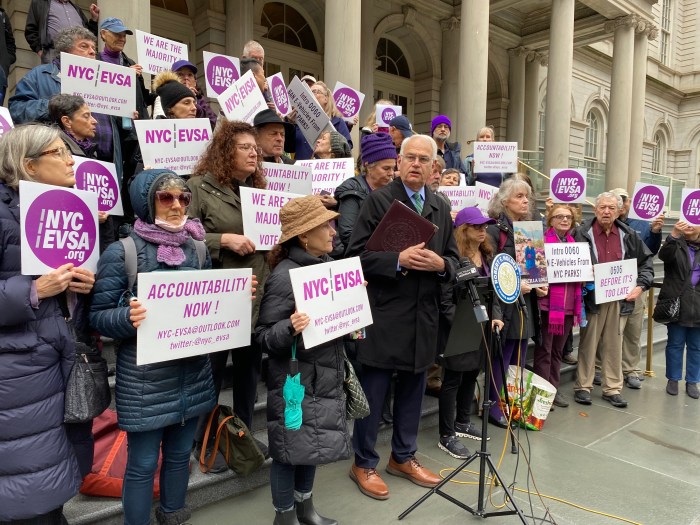
The court-ordered halt on the city’s 14th Street busway plan has cost commuters nearly a year’s worth of time stuck in traffic, advocates claim.
Rush-hour M14 bus riders have spent a combined 8,654 additional hours commuting over the last month than would have been the case under the city’s plan to transform the busy Manhattan corridor into a primarily bus- and delivery-only street, according to an analysis from the nonprofits Transportation Alternatives and Riders Alliance.
That plan — originally proposed in tandem with the L train shutdown — was blocked from launching in the beginning of July after a group of neighborhood block associations filed a lawsuit against the city.
“When you stop improvements on the M14, what you’re doing is you’re obstructing the commutes, the daily transportation of well over 25,000 New Yorkers,” said Riders Alliance policy and communications director Danny Pearlstein, citing the route’s daily ridership.

At a rally on 14th Street Monday morning, the groups continued to argue that the lawsuit was steeped in classism — that wealthy New Yorkers in neighborhoods surrounding the busway are fighting service improvements for everyday bus riders, who citywide have an average annual income of about $28,455.
“So that’s why we’re here today: to add riders’ voice to litigation between the wealthy powerful residents of Greenwich Village and Chelsea and the City of New York to say … this is about bus riders,” he added. “Let’s get the buses moving again.”
The groups reached their numbers by comparing city trip-saving projections under the busway to daily ridership on the M14. They plan to submit their analysis in an amicus brief. A court date on the lawsuit is planned for Tuesday morning.
As proposed by the city Department of Transportation, the busway would limit through-traffic on most of 14th Street to buses and trucks between 6 a.m. and 10 p.m. Cars would still be able to make pickups and drop-offs, or access area garages, in what would be a first-of-its-kind design for the city.
After years of fighting the busway and nearby bike lanes on 12th and 13th streets, a group of block associations on the West Side’s tony Chelsea, Greenwich Village and Flatiron neighborhoods filed a last-minute lawsuit against the plan in June and the judge presiding over the case has ordered a temporary restraining order as the case proceeds.

Arthur Schwartz, a resident of 12th Street and the lawyer representing the block associations, argues that the city has not completed proper environmental work for a project that is more involved than its routine traffic management.
Schwartz said the busway would lead to unmanageable traffic spillover on nearby streets and that, despite the high household incomes in the neighborhoods, there are a number of rent-regulated tenants.
“This is not class war — this is about the lungs and ears and neighborhood character of rent-regulated tenants,” Schwartz said.
Philip Leff, chair of Transportation Alternatives’ North Brooklyn Committee, said opponents were “perverting the language of environmentalism.”
“I think they think they own the street,” Leff added. “I think that’s very logical if you live in a gated community in Greenwich, Connecticut. But this is not — this is a public street in Greenwich Village. You do not own the streets.”




































